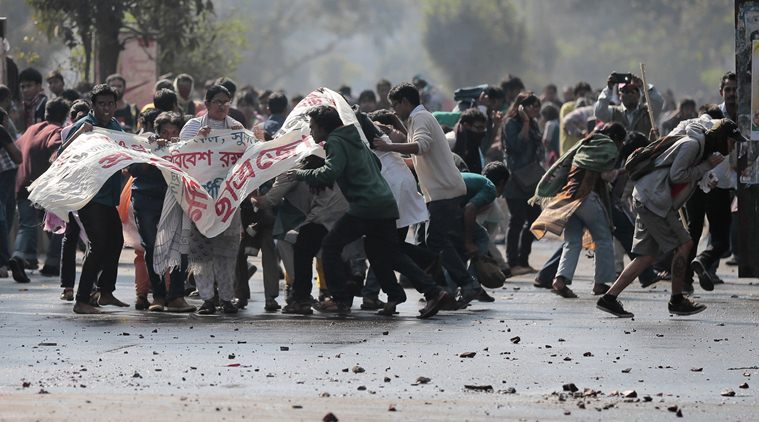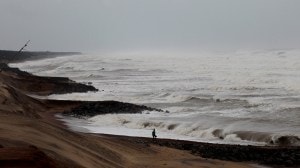Stay updated with the latest - Click here to follow us on Instagram
Police in Bangladesh clash with protesters over power plant
The protesters, consisting mostly of leftist political groups and citizens, had called for an eight-hour general strike in Dhaka on Thursday.
 Bangladeshi protestors run for cover, as policemen fire tear gas shells to disperse protestors demanding cancellation of a plan for a massive coal-fired power plant near a mangrove forests on the coast in Dhaka, Bangladesh. (AP Photo)
Bangladeshi protestors run for cover, as policemen fire tear gas shells to disperse protestors demanding cancellation of a plan for a massive coal-fired power plant near a mangrove forests on the coast in Dhaka, Bangladesh. (AP Photo)
Police in Bangladesh’s capital fired tear gas and rubber bullets on Thursday to disperse protesters demanding cancellation of plans for a massive coal-fired power plant near ecologically sensitive mangrove forests on the coast. Five people were injured. The protesters, consisting mostly of leftist political groups and citizens, had called for an eight-hour general strike in Dhaka on Thursday. The violence took place at Shahbagh intersection in Dhaka, but most of the city was unaffected.
The government insists that the planned 1.3-gigawatt Rampal power station near the Sundarbans, a world heritage site, is key to reaching its target of 24 gigawatts of electrical capacity by 2021. UNESCO says the plant poses a serious threat to the Sundarbans, a low-lying delta region comprising about 200 islands at the northern fringe of the Bay of Bengal.
The $1.8 billion project, approved in 2012, is a joint venture between Indian and Bangladeshi state power companies. It calls for building what would be Bangladesh’s largest coal-fired power plant just 65 kilometers (40 miles) from the Sundarbans. The Sundarbans, formed over millennia as rivers deposited silt carried down from the Himalayas, is teeming with wildlife including a few hundred endangered Royal Bengal tigers and endangered species of river dolphins.
Most of the Sundarbans region is located in Bangladesh, with a third falling within India. It is also home to some 13 million impoverished Bangladeshis and Indians, who are mostly off the electricity grid and would not benefit directly from the project.



- 01
- 02
- 03
- 04
- 05




























